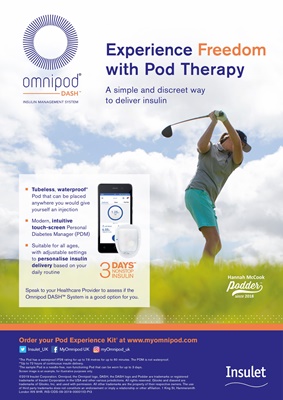
KITLIVING
High blood glucose and a rise in T1 diagnoses in children
linked to Covid-19; ARCADIA trial underway.
CORONAVIRUS UPDATE (5)
Staying safe and well
A
new therapy that
could treat people with
diabetes suffering from
Covid-19 is undergoing
an advanced clinical trial
in the UK.
The Medicines and Healthcare
products Agency (MHRA) has approved
the trial - named ARCADIA - following
preclinical research that suggests a
glucose kinase activator (AZD1656)
could help people with diabetes infected
with coronavirus by dampening the
overactive response of the immune
system typically acute in those patients
with raised blood glucose levels. The
trial will involve hospitalised patients with
mild to moderate Covid-19 symptoms
and, if successful, the compound could
ultimately be prescribed by a GP for
people with diabetes presenting with early
Covid-19 symptoms.
Over half a million people have been
referred into the programme, and those
completing the programme who were
overweight or obese lost on average
3.6kg, greater than initially predicted.
GPs are also now being encouraged
to prescribe cycling as a way for their
patients to lose weight, as part of a new
government strategy to tackle the nation's
obesity crisis.
Early-onset Type 1?
Imperial College London researchers want
to investigate a possible link between
Type 1 diabetes and Covid-19 after a
small study found cases of Type 1 among
children almost doubled during the peak
of Britain's coronavirus epidemic.
The study, published in Diabetes
Care, analysed data from 30 children in
London hospitals diagnosed with newonset Type
1 diabetes during the first
peak of the pandemic - around double
the cases during this period in previous
years. Twenty-one children were tested
for Covid-19 or had antibody tests -
and five tested positive for the infection.
"More research is needed to establish
whether there is a definitive link, ... but in
the meantime, we hope clinicians will be
mindful of this," said Karen Logan, who
co-led the study.
Covid-19 and hypers
New research indicates that nearly
half of hospitalised Covid-19 patients
without a prior diabetes diagnosis have
hyperglycaemia - which is an independent
predictor of mortality at 28 days.
Several previous studies have shown
a link between hyperglycaemia and worse
outcomes in Covid-19, and at least one
diabetes diagnosis, but this is the first to
focus specifically on that group of patients.
The findings, analysed retrospectively
from 605 patients with Covid-19 treated
at two hospitals in Wuhan, China, saw
that a fasting blood glucose of 7mmol/l or
more on admission - present in 45.6% of
those without a prior diabetes diagnosis
- was an independent predictor of 28-
day mortality
Although HbA1c data wasn't
analysed, the population is believed to
include both individuals with pre-existing
but undiagnosed diabetes and those
without diabetes who have acute 'stress
hyperglycaemia'.
"Glycaemic testing and control should
be recommended for all Covid-19 patients
even if they do not have pre-existing
diabetes, as most Covid-19 patients are
prone to glucose metabolic disorders,"
said Sufei Wang, of the Department of
Respiratory and Critical Care Medicine,
Union Hospital, Tongji Medical College,
Huazhong University of Science and
Technology.
"Addressing elevated fasting blood
glucose at an early stage can help
clinicians better manage the condition
and lower the mortality risk of Covid-19
patients."
The study is published in Diabetologia.
Glycaemic testing
and control should be
recommended for all
Covid-19 patients even
if they do not have preexisting diabetes
" continued over